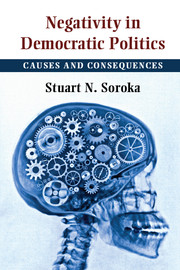Book contents
3 - (Political) Impression Formation
Published online by Cambridge University Press: 05 June 2014
Summary
The evil that men do lives after them; the good is oft interr'd with their bones
– ShakespeareA set of new investigations into negativity biases in public opinion begins here, with an analysis of U.S. presidential evaluations, building directly on models of impression formation in the psychological literature discussed in Chapter 1. As past work in psychology suggests, negative domain-specific evaluations matter more to overall U.S. presidential assessments than do positive domain-specific evaluations. Analyses demonstrating this fact, which follow in this chapter, are partly a replication of past work, albeit with considerably more data and a somewhat different approach to modeling the asymmetry. But subsequent analyses then extend considerably what we know about political impression formation. First, comparative results make clear that the same dynamic is evident in other countries, supporting the notion that the negativity bias is not just a U.S. phenomenon. Subsequent analyses reveal heterogeneity in negativity biases as well. In short, they make clear that some people rely more strongly on negative information than do others. A final section then considers the difficulties in distinguishing “neutral” in interval-level measures – difficulties that make capturing the negativity bias difficult in some circumstances, and that point to the possibility that some past work finding a lack of evidence of a negativity bias may have been mistaken.
Each of these issues is dealt with in turn throughout this chapter. Demonstrations rely on individual-level survey data drawn primarily from the American National Election Studies, but also from a series of Australian National Election Studies. In sum, results make clear the connection between work on impression formation in psychology and public attitudes toward political candidates. Moreover, they provide strong illustrations of a negativity bias in political behavior.
- Type
- Chapter
- Information
- Negativity in Democratic PoliticsCauses and Consequences, pp. 32 - 50Publisher: Cambridge University PressPrint publication year: 2014



